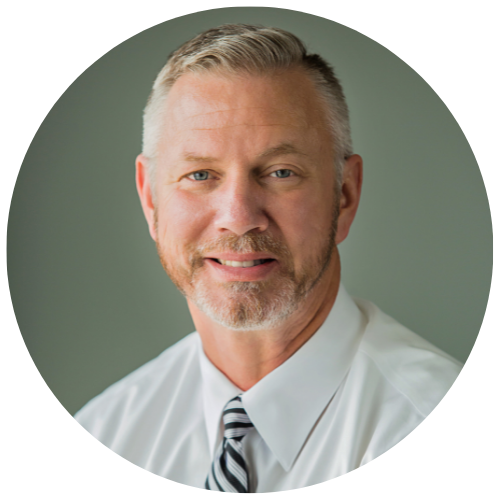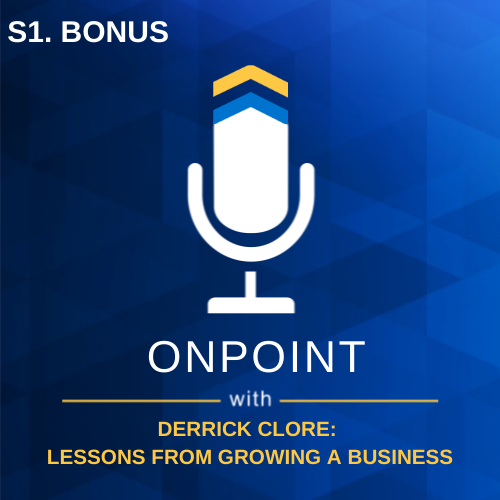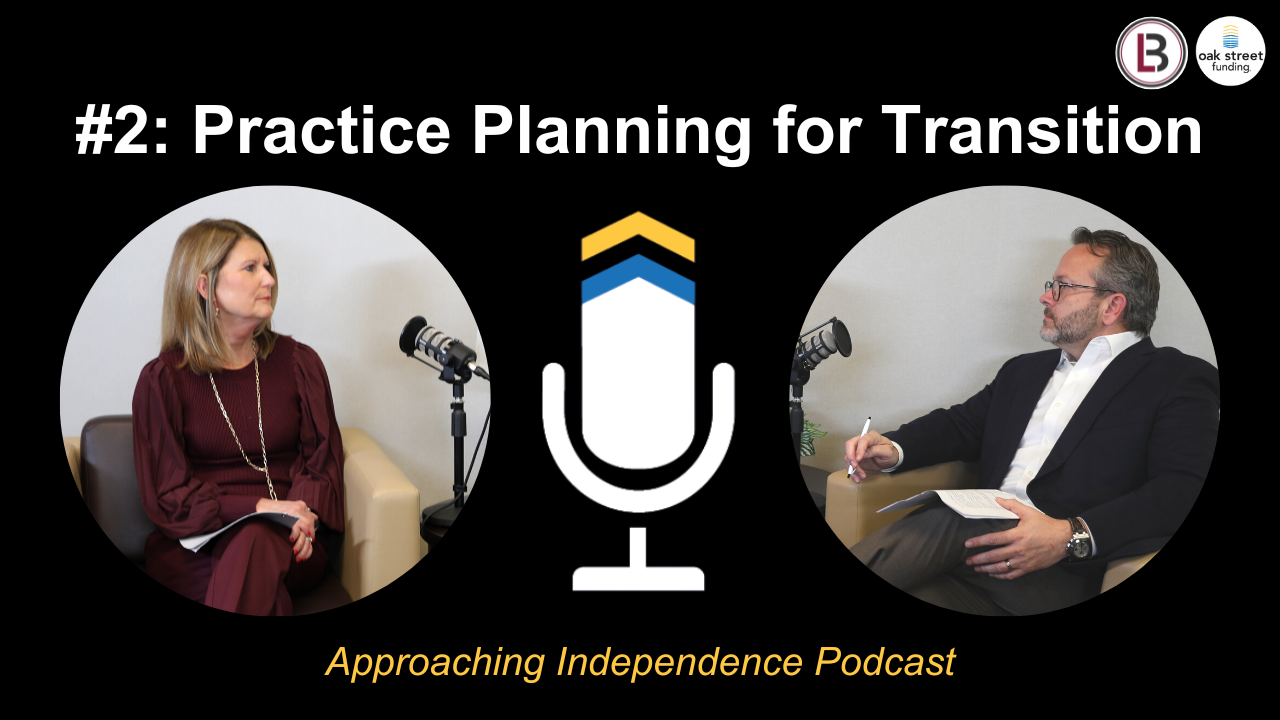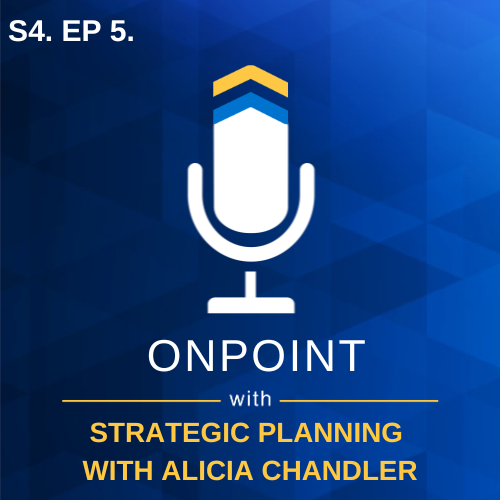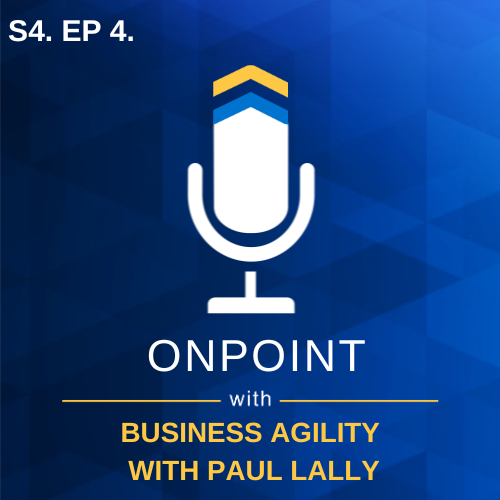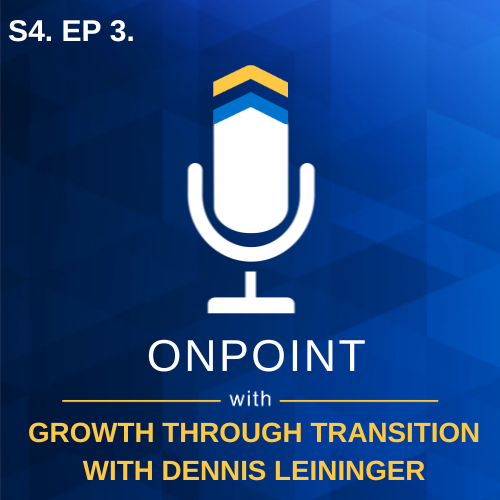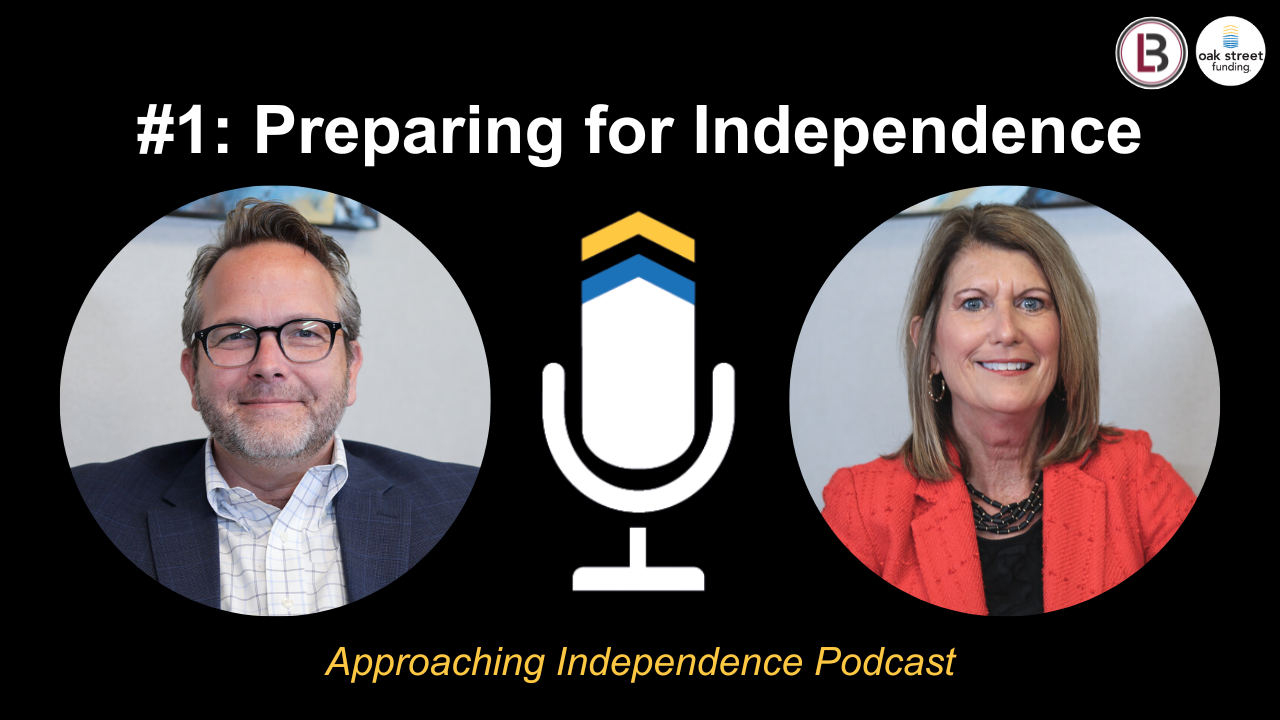S1. Bonus Episode - Lessons From Growing a Business with Derrick Clore of Clore Insurance Group
- 0.5
- 1
- 1.25
- 1.5
- 1.75
- 2
Bridget Haight: Hello, and welcome to OnPoint, a podcast by Oak Street Funding where we bring research and data- backed insights to dig into the minds of industry leaders to learn how to stand out, to navigate, and to break through this ever changing industry. I am your host Bridget Haight. You can support this podcast by following us on Spotify, Apple Podcasts, on our website, or really wherever you get your podcasts. We will be there hanging out, talking to industry leaders, and ready to empower you to grow your business. Now let's get on point. So today we welcome Derrick Clore, President of Clore Insurance Group in central Indiana. Derrick, thank you for joining us today.
Derrick Clore: Thank you for inviting me.
Bridget Haight: Thank you for being here and we are going to talk about how you have successfully grown your business and what you've learned along the way.
Derrick Clore: Great.
Bridget Haight: So let's get started with our discussion. Let's talk about why you decided to buy a business and how you went about doing it.
Derrick Clore: The reason I bought the business may not be the textbook reasons that some people do buy business. But frankly I bought the business because I was the vice president of a bank and we merged, and my career path changed as a result of that merger. And I didn't much care for it, and so I decided I'd ask my insurance agent, if she ever thought about selling her agency. And I hadn't sold a lick of insurance in my life, didn't know the first thing about the insurance industry. And as I had said before, I probably had more ambition than brains, but the rest, as they say, is history. She was in the process of wanting to retire and it worked out nicely.
Bridget Haight: And you jumped in head first.
Derrick Clore: That's correct.
Bridget Haight: That's awesome. Well, looking back at your experience buying a business, what advice would you give someone who's looking to do the same? Anything that you would do differently?
Derrick Clore: Well, there are always things you'd do differently. We've been very blessed. As I explained before we've grown exponentially over those years, certainly we've made some mistakes. You don't have enough time on this podcast to talk about all things I should have done differently. Fortunately, we had enough good people and God's good grace that we were able to overcome those hurdles. But I would just say, do your homework, know your industry. I was very fortunate that I had a strong network and a community where I grew up and that carried me a long way. But do your homework, know the industry for sure. That seems like it's business 101.
Bridget Haight: No, that makes sense though.
Derrick Clore: When I walked into the little one person shop that I bought, there were manila folders stack up on the floor and Post-it notes on file cabinets, and I didn't know what a train wreck that could have been. So know the business, I guess, before you dive in head first.
Bridget Haight: That's good advice. So after your purchase was complete, what would you say was your first major growth strategy? When did you say, "Okay, now I own this business. How can I now begin to grow it?"
Derrick Clore: Well, again, this isn't podcast that you're probably going to be proud of because you wanting all these tidbits to help people. And the reality is, initially my plan was, "Hey, I can do it. I'm going to go outwork everybody. I'm going home at dark when everybody else is going home at five." I know a lot of people and again, a lot of ambition, maybe more so than brains, but I can tell you that only carries you so far. And so, as we began to grow, I think what really was the catalyst for me to understand that, listen, we need to be more thoughtful in our planning was when I began to hire people and I knew that it wasn't just my future, but theirs that I was impacting. And so we had to be a little more, as you say, scientific, methodical in our planning with the purpose. And as we grow, and Oak Street helps us do some of that, we know that we're accountable not only to our employees, but to Oak Street and everybody that partners with us and believes in us. So we do have a plan. And I would just say that business owners, whether it's insurance or otherwise, are all at risk of the business, outgrowing their acumen. And so you've got to sharpen the saw, and you've got to constantly ask questions. There are plateaus you hit. And when those plateaus are hit and you start to slow, you have to take a hard, painful look in the mirror and say," Okay, what am I missing? What am I not getting right?" It's easy to go out there and pull the data, and do market share analysis, and your market penetration and say, "Hey, I want to set this goal. If I set this goal, every salesperson knows how to work backwards from a sales goal." It's business 101, sales 101, but do you know how to look at the tools, the systems, the procedures, the policies you have? And most of us don't, especially those of us that have never done it before in an industry. And so you got to go get help. Reach out to people, find accountability partners, find people that are doing it better than you, longer than you, that you aspire to be like and model them. Tony Robbins got famous and wealthy off the whole modeling notion, philosophy. And it's true. Don't try to reinvent the wheel.
Bridget Haight: Right. Surround yourself with those who have figured it out.
Derrick Clore: Surround yourself with those people, say a lot of prayers, and keep people in mind. We have a philosophy in our business that reads we'll take a good night's sleep over a dollar and that guides us on all we do.
Bridget Haight: That's great. So you have grown the business from one to six agents. What is your hiring philosophy?
Derrick Clore: I hire people who love people. Every time I've tried to hire a salesperson, it's failed. It's probably my fault. Listen, first of all, let's get technical with this. If you own an insurance agency, the number one contributing factor to the value of a book is retention. Retention is service and service is hard for people. Principal agents like myself are really sales oriented. I love sales. I'm decent at it finally. But it's a misnomer, it's a misconception by most principal agents that they want to load the wagon, load the wagon, load the wagon. Yes, we do. I want to do that too. It's part of growth. But listen, if every time you sell an account, two are walking out your door, you're not growing. So I think our focus has been to high hire people with a heart for people. Traditionally we've hired people that weren't experienced and we taught them. I made an exception of that recently and just hired somebody with 10 years experience. And I will admit, it's a lovely experience.
Bridget Haight: Do you find that you tend to hire people that you recognize qualities of yourself in, or do you-
Derrick Clore: Oh dear God, no.
Bridget Haight: You hire those that have qualities outside of your own?
Derrick Clore: Yes. The latter. I feel like I definitely look for people that probably have some... I'm not going to sell much self short. I do bring some good qualities to it, but honestly most leaders, I'd say they find people that do things that they're not good at. And it's not that I don't love people. I absolutely love people, but I think that I hire people that I can tell, first of all, that you want to hire somebody that presents him or herself in a professional way that who can learn. But you can tell in an exchange, at least I feel like I can, if somebody where their value set is. And we have a culture in our business that has really lent itself nicely to retention. And that culture is that we take care of our clients. And that's become such a trite phrase, I understand, but-
Bridget Haight: That's great though.
Derrick Clore: I'm babbling on and on.
Bridget Haight: No, no, no. Everything you're saying makes total sense to me. So a hot topic for many business owners today is talent hiring and retention just as you said. So what advice do you have for other business owners as far as retention is concerned?
Derrick Clore: So retention of employees?
Bridget Haight: Yes.
Derrick Clore: Yeah. So while we live in a challenging time, and by that I mean we're coming off a season where corporate America has changed. And so you're seeing people that felt cornered in a remote geographical location with an employer who now can get a job working remotely anywhere in the world. Now that's going to come back to bite these big companies that are recruiting.
Bridget Haight: Oh you think? Really?
Derrick Clore: Hands down. Here's what's happening, and I'll get the question. I'm famous for avoiding the question. But what's happening is these people are being recruited away and they have been lulled into this false sense of security that technology replaces relationship. And these people are working from home. And this isn't a popular answer, but you can only do that so long before it starts showing through. You lose the charisma, the dynamic of being engaged with your fellow professionals, and keeping yourself sharp. How quickly, how you think, what you learn, how you learn dynamically on the job, all of those things. There's going to come a time where companies who are lulled into that false sense of security realize they have lost a lot in their service, and they're going to go back. It's going to come back. And when that happens, those people that are lulled into that are going to be in trouble.
Bridget Haight: You're going to be scrambling.
Derrick Clore: They're going to be scrambling. So the question again was?
Bridget Haight: So what advice do you have for business owner? As far as retention is concerned?
Derrick Clore: You've got to help me along the way.
Bridget Haight: You got it.
Derrick Clore: So I do think it's important, especially as a small business owner, which a lot of the insurance agencies are small business, we have to find ways to create value in that relationship. And it's not always money. Again, business 101 tells you, HR 101 that salary income is not enough to keep a person in a job. So creating flexibility in a job without going so far that you lose, that you do what I just talked about.
Bridget Haight: Right. Working in a vacuum situation.
Derrick Clore: Right. So there are lots of ways to do that. First of all, education. I think education is very important. People are more satisfied who are continually sharpening the saw and becoming better, are learning more. And then being flexible. We're a family friendly agency. So I have a standing, I guess, policy that, listen, if you've got a thing you need to go to for your kids, your grandkids, and you've got a dart a couple hours early because their game is away, go. This is not where life begins and ends, right? This is part of what we have to do. Being liberal with vacation. I just think making it family. I know that sounds small minded, but treating people like you want to be treated.
Bridget Haight: That makes total sense.
Derrick Clore: Nobody wants a boss. That's another thing. We don't allow anybody to call me the boss. I don't want a boss. Nobody wants a boss, right? We're accountable to each other.
Bridget Haight: So you're not Mr. Clore at work?
Derrick Clore: I'm a lot of things. I would say Mr. Clore is often the least.
Bridget Haight: So how do you determine that a growth opportunity, like a potential acquisition, is right for you?
Derrick Clore: That's a great question. Glad you asked that.
Bridget Haight: Thank you.
Derrick Clore: Yeah. I'm really glad you asked that, because I had this conversation. Also I think that when I bought my agency, I think a lot of seasoned agents would've looked at the deal and probably scoffed at me a little bit and what I paid. The joke would've been on them. I think that people get caught up in looking at multipliers and they have this preconceived notion that, "Hey, this is the top multiplier I should use." Whatever number that you want to use, really it's all about return on investment and cash flow. If that deal cash flows, and I'll get into some other things. But if the deal cash flows and your return on investment is sound, it's a good deal. I don't care what the multiplier is. It doesn't matter to me what that multiplier is. If you go out and spend a million dollars on an agency and you've got a $100,000 down, and you don't grow it a dime, in 10 years you've pulled out some small amount for yourself. Let's call a half a million over 10 years that you've pulled out. Or maybe $250,000 it doesn't matter. And you haven't grown a dime and you sell it for the same million. You've just pulled out one and a quarter million dollars on $100,000 investment over a 10 year period. So you tell me, does that like a good investment?
Bridget Haight: Yes. It does.
Derrick Clore: Okay. I want to just take a step back though. There are a lot of other things to it besides finance. So you can have a deal where the numbers look good, but if you get out over your skis with regard to book size let's say. If you're a million dollar agency and you're trying to buy a $5 million agency, you've never really been down that path. You don't know what it takes to do that. Or if you have totally different carriers and there's not some commonality on major carriers that are contributing to most of your book size, that can be problematic. Or if you're buying a book that you're not staffed for. In other words, if you're not buying staff with it that's seasoned and able to perpetuate the service, you better be bringing staff with you with the time and experience to do that. So there are a lot of dynamics. You can make it sound easier than it is on a piece of paper looking at numbers only, but there are a lot of dynamics that can take it from the good to bad. Is the book makeup similar to your own? Is it largely commercial or largely personal lines? If it's the opposite of what you're used to doing, again another thing that can create a problem. Most agents I think probably know those things, but we can be over confident.
Bridget Haight: Okay. So some business owners may not be able to grow through acquisition right away. What ways did you grow your business through organic means?
Derrick Clore: Yeah. So I think to me, the most important thing that we did was we branded our primary carrier. I was surprised when I bought the agency. There are a lot of different answers to that, depends on the situation of the agent. But our agency was really obscure and I never understood why, because our primary carrier was so much better than the competition. So much better. And so I went to work right away at branding that carrier and highlighting to the public the differences. And when I say highlighting, I mean using local papers and radio for press releases, whether it's awards or whatever the case may be, through social media, multiple marketing approaches, billboards, Friday Night Lights, the things that you do, sponsoring halftime free throw contests, things like that. But more importantly, I just feel like getting big, bold messages into the paper and ads saying, "Hey, this is totally different, what's under the hood," and that's the thing that people don't know. And when they buy insurance. They assume that what's under the hood is the same everywhere, and it is so wrong. And you'll find out at the worst possible time when you file claims. And so I think that's part of it. We've done a lot of press releases to highlight and brand what makes us better and different. And driving home confidence, trust through third party validation. That's really important. So when you can say, "Hey, look." A lot of times people want to say, "Hey, look, this carrier, I represent ABC company. And they're this big." I was always taught. If you try to sell me on something and I can turn around and say, "So what?" You've just tried to sell me a feature rather than a benefit. So what? What's the benefit of that? So those kinds of things.
Bridget Haight: Okay. As we wrap up our time today, what final advice would you give other business owners looking to grow their business?
Derrick Clore: Yes. Tough question. I should know that right away.
Bridget Haight: Hard hitting.
Derrick Clore: I'm afraid you had me anyway, right?
Bridget Haight: Yes.
Derrick Clore: I think to constantly put a mirror in front of yourself. And by that, I mean go to people you trust, and find accountability partners that are doing things that you aspire to do. One of the things I found, I've got a few people like that I'll come up and say, "Hey, here's what I'm trying to do. Here's what I think we should be doing." What you'll find out is you're getting some things right. I've been surprised at how many things we're getting right. And sometimes those people like, "Really? Wow, that's a great idea." But obviously other times those people are like, "Look, we've been there, done it. Maybe it'll be different for you, but didn't work for us."
Bridget Haight: So is this competition that you're talking about? Are you calling-
Derrick Clore: Yeah. I wouldn't call it competition. I would call it my friends that are in the same business. There's plenty business to go around.
Bridget Haight: Sure. Okay, I have one more question for you. So what do you think you would want to be remembered for? What's one thing that you would want to be remembered for? What is your legacy?
Derrick Clore: I tell you some things I don't want to be remembered for. I want to be known as a really good guy. I think I want my clients to say I was there for them. I want my employees to say I was there for them. They could count on me when they needed me. And that I'm really fair. And I try to approach business, whether it's with a client or a team member, with their best interest at heart. I learned from a farmer that I sold insurance to. He said he learned he would do a little exercise and put kernels of corn out there and ask a potential business partner to split the corn up between them. And if it looked like the guy or the gal pulled all the big kernels over their side, he wouldn't do business with them. I want to be that way. I used to really, as a young man, a lot of business owners, ambitious entrepreneurial spirits, pride themselves on getting the best end of the deal. I don't do that anymore. I don't want ever feel like I entered deal with somebody and I got a better end of the bargain. I want it to be very, very good for everybody. So I guess that's a long answer. You know me by now. I always give long answers.
Bridget Haight: I love that. That's great. Well, thank you so much for joining us today, Derek.
Derrick Clore: Thank you for having me. Appreciate it.
Bridget Haight: Thank you all for listening to OnPoint, a podcast by Oak Street Funding where we bring research and data- backed insights to dig into the minds of industry leaders to learn how to stand out, navigate, and break through this ever changing industry. I'm Bridget Haight and tune in next time, wherever you listen to podcasts, as we begin season three. See you then as we get on point. Oh, and don't forget to subscribe and leave us a review.
DESCRIPTION
Today, we welcome Derrick Clore – President of Clore Insurance Group in central Indiana. Join as we talk about the ways he has successfully grown his business and what he has learned along the way.
Today's Host
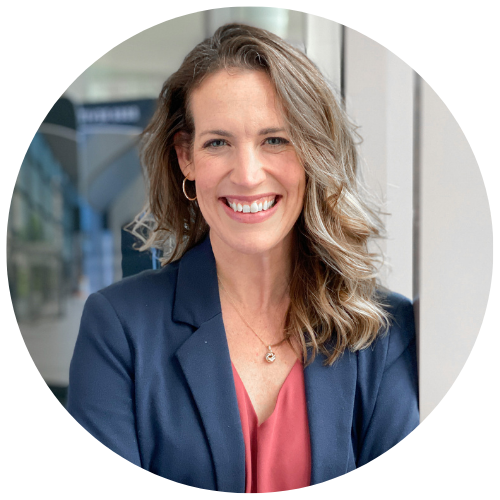
Bridget Haight
Today's Guests
